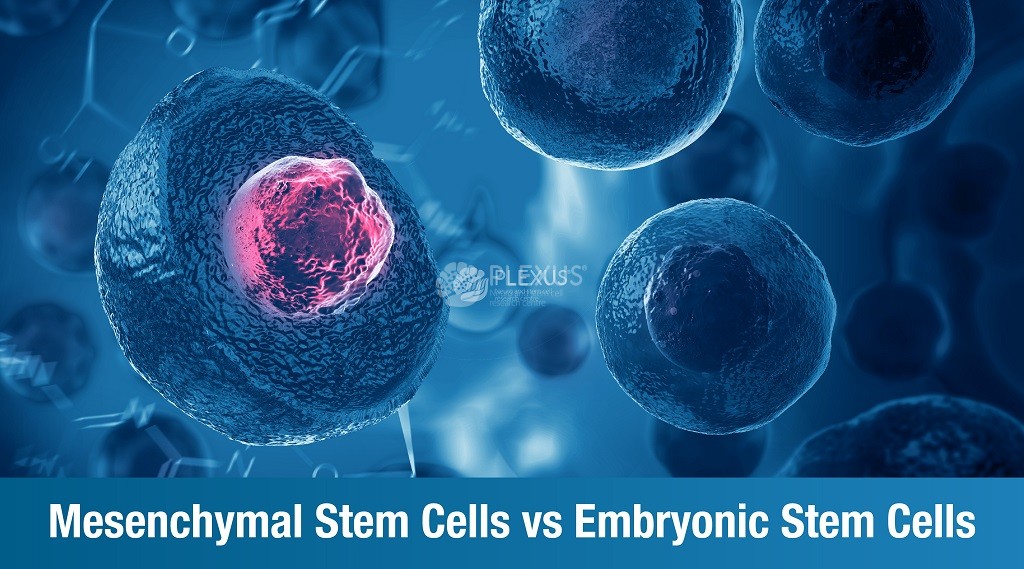
In less than a century, Cell therapy has become an integral part of neuro-rehabilitation. Regenerative medicine, as Cell therapy is called, uses Cells to repair or restore function of damaged, dysfunctional, and/or injured tissue.
At Plexus, India’s best Cell specialists use Cells to treat a variety of neurological disorders. From managing their symptoms to slowing down the progression of degeneration, Cell therapy benefits people suffering from neurological conditions like spinocerebellar ataxia, Parkinson’s, multiple sclerosis, motor neuron disease, spinal cord injury, stroke, etc.
Of the four types of Cells, the most preferred Cells are mesenchymal Cells. And the most controversial of the lot are embryonic Cells.
Let’s find out why!
About Mesenchymal Cells
Mesenchymal Cells (MSCs) are adult Cells with anti-inflammatory, immunomodulatory, self-renewal, cell-division, signaling, and differentiation properties. They can divide and develop into many specialized cell types in specific organs and/or tissues. They even have the unique ability to become specific Cell types and can create more Cells when cultured in a laboratory. MSCs can replace cells that are diseased or damaged.
The first MSCs were found in the bone marrow and were capable of making bone, cartilage, and even fat cells.
Sources of mesenchymal Cells include –
- Umbilical cord – collected at the time of birth
- Bone marrow – through a process called bone marrow aspiration
- Adipose tissue – through liposuction
- Peripheral blood – through apheresis (like blood donation)
- Placental tissue – collected at the time of birth
- Synovial fluid (present in joints) – through arthrocentesis
- Dental pulp – through apicoectomy (procedure to remove the tip of a tooth’s root)
Research suggests that MSCs may even be derived from endometrial polyps and menses blood.
MSCs can differentiate into a variety of cell types like –
- Osteoblasts (bone cells)
- Adipocytes (fat cells)
- Chondrocytes (cartilage cells)
Studies show that MSCs also have the potential to differentiate into –
- Epithelial cells (found inner and outer surfaces of your body)
- Endothelial cells (found in blood vessels)
- Neurocytes (nerve cells)
- Myocytes (muscle cells)
- Cardiomyocytes (heart muscle cells)
- Hepatocyte (liver cells)
- Pancreatic cells
Mesenchymal Cell transplantation has been known to slow down the rate of degeneration caused by MND, Parkinson’s and other neurological conditions.
About Embryonic Cells
Commonly referred to as pluripotent Cells, embryonic Cells (ESCs) are derived from the inner cell mass of an embryo in its early stages of development. These cells are usually grown in laboratory conditions. ESCs are derived from unused embryos that are from an IVF procedure.
In 2001, the then US President George W. Bush put a ban on the funding of research on Cells derived from human embryos because it involved the ‘destruction of human life.’
ESCs have self-renewing potential and can differentiate into clinically relevant cell types like dopamine neurons, cardiomyocytes, beta cells, etc. Being pluripotent, these unspecialized cells can be differentiated into any cell type in the body. They do not have any specific characteristics like shape, or gene expression pattern.
ESCs can be used to regenerate or repair damaged tissue and organs.
What are induced pluripotent Cells?
In 2006, Japanese physician and researcher Shinya Yamanaka made an incredible breakthrough. He developed the first induced pluripotent Cells (iPSCs). Derived from blood cells of epithelial cells (skin cells), iPSCs are reprogrammed to an embryonic-like pluripotent state.
Simply put, iPSCs are embryonic Cells minus the controversy!
Self-renewing and with the potential to differentiate into any cell-type, iPSCs significantly lower the risk of immune rejection because they are derived from the patient’s own body.
India’s no. 1 Cell therapy centre
Cell therapy at Plexus is safe and risk-free because the autologous mesenchymal Cells are drawn from the patient’s blood, bone marrow, or adipose tissue. They are progenitor cells that have the potential to multiply and transform into specialized cells, taking on the functions of the damaged cells by replacing them.
Cell therapy at Plexus guarantees the following benefits:
- Enhanced everyday functioning
- Improved quality of life
- Immune system modulation and reduction of inflammation
- Prevention of further nerve damage
- Speedy recovery post-procedure
- Non-surgical procedure
- Zero complications and side-effects
The procedure is conducted by Dr. Sadiq, India’s no. 1 Cell specialist, and his team of highly-skilled and experienced Cell specialists.
Consult Dr Sadiq today.
Call +91 89048 42087 | 8229999888
FAQs
What are the two types of Cells?
Cells are of two types – embryonic Cells and adult Cells
What are two characteristics of embryonic Cells?
Embryonic cells can self-renew and can differentiate into any cell-type. This is why they are also called pluripotent Cells.
What are the disadvantages of embryonic Cells?
The main disadvantage of embryonic Cells is how they are derived – from human embryos in their early stage of development.
What are the limitations of embryonic Cells?
Embryonic Cells are donor Cells and run the risk of being rejected by the patient’s body/immune system.










